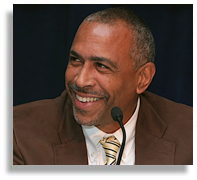|
Learning in the Trump Era by Pedro A. Noguera University of California, Los Angeles, Los Angeles, California
After a year in office it’s clear that other issues are more important: war (and threats of war), the economy, immigration (the wall?), hurricanes in Houston and Florida, investigations into Russian hacking of the 2016 election, and of course, healthcare. All of these issues have consumed so much of the President’s time and attention, there’s been little space left for what to do about reading, writing and arithmetic. For those who have feared what the Trump administration might do to re-make education, neglect might be a good thing. Signs that education would be a low priority for the administration became clear when the administration announced its budget priorities in May and stated its desire to cut 9.25 billion dollars (13.5%) from the US Department of Education. With few resources at her disposal there’s little wonder why it’s been difficult for Betsy DeVos, Trump’s billionaire Secretary of Education, to drive the department in a direction consistent with her conservative, Christian values. Such misstatements are of course less consequential than the actions she would like to take and has taken at the Department of Education if she could get her way. Though Republicans criticized the Obama administration (and to some degree the Bush administration) for infringing upon states’ rights through policies such as No Child Left Behind and Race to the Top, under DeVos the US Department of Education has tried to have it both ways; claiming they want to reduce the role of the federal government in mandating education policy to the states, while also attempted to use ESSA (Every Student Succeeds Act), to influence state policies related to standards and accountability. The USDOE, like many other departments in the Trump administration, has yet to fill many key posts. Those that have gone through have raised eyebrows and ire in some quarters. She appointed a woman who opposed affirmative action to lead the Office for Civil Rights (Candice Jackson), then on September 2nd she announced that she would appoint a former Dean at DeVry University, Julian Schmoke (DeVry is a private, for-profit college with slightly more credibility than Trump University) to serve as head of the unit charged with investigating fraudulent loans. The fact that DeVry was required to pay a fine of 100 million in 2011 for issuing questionable loans was apparently not a disqualifier for Schmoke. Other actions by the USDOE under Trump/DeVos have been suspect but barely newsworthy:
In keeping with their war on science, the Republican controlled House of Representatives is also considering the Rooney Amendment, the Make America Secure and Prosperous Appropriations Act, 2018 (H. R. 3354), which would slash federal funding for the non-partisan Institute of Education Sciences (IES) by one-third, undermining the agency’s mission of advancing independent scientific evidence, statistics, and data. As important as these issues are, since the election of Donald Trump, the biggest day-to-day challenge for educators are not so much the policies that have been adopted by the USDOE, but rather the statements and actions of the president himself. Perhaps the most significant of these was the recent decision to eliminate DACA (aka the Dream Act), an executive action that will turn 800,000 young people who were raised in the US into fugitives unless Congress steps in to find a way to extend the protections ordered by Obama. Despite the fact that DACA has been supported by a broad array of business and religious leaders, many of whom were prominent Trump supporters, the president has once again prioritized appeasing his base which can’t seem to get enough of his anti-immigrant policies and rhetoric. Educators teach students to support their assertions with logic and scientific evidence. How does one explain a president who denies the existence of climate change? What does an educator who would prefer to avoid politics altogether do when nearly everyday Trump uses language that is inflammatory, dangerous, and even bizarre? While Trump may not be impeached, his administration will not last forever. There will undoubtedly come a time in the not too distant future when we will look back upon the Trump years and ask ourselves how we allowed this to happen? Already, some educators blame themselves. Perhaps if we had done a better job teaching students how to distinguish between fake and real news, if had we promoted critical thinking rather than a regurgitation of facts and information, if had we actively encouraged rigorous debate based on evidence and well-reasoned assertions, maybe Americans would have been less easily manipulated and more intelligent voters. Most of all, had we studied US history without the goal of promoting patriotism but with a willingness to confront ugly truths, maybe we would be less inclined to hold onto myths, lies and distortions that have been passed down over generations. Also see: |
||||||
If you have any thoughts on this or would like to contribute to an ongoing discussion in the  What is New? || Affirmative Action || Art Changes || Autonomy: Chiapas - California || Community Images || Education Rights || E-mail, Opinions and Discussion || En español || Essays from Ireland || Global Eyes || Healthcare || Human Rights/Civil Rights || Piri Thomas || Photo of the Week || QA: Interviews || Region || Rural America || Search || Donate || To be notified of new articles || Survey || In Motion Magazine's Store || In Motion Magazine Staff || In Unity Book of Photos || Links Around The World NPC Productions Copyright © 1995-2017 NPC Productions as a compilation. All Rights Reserved. |


